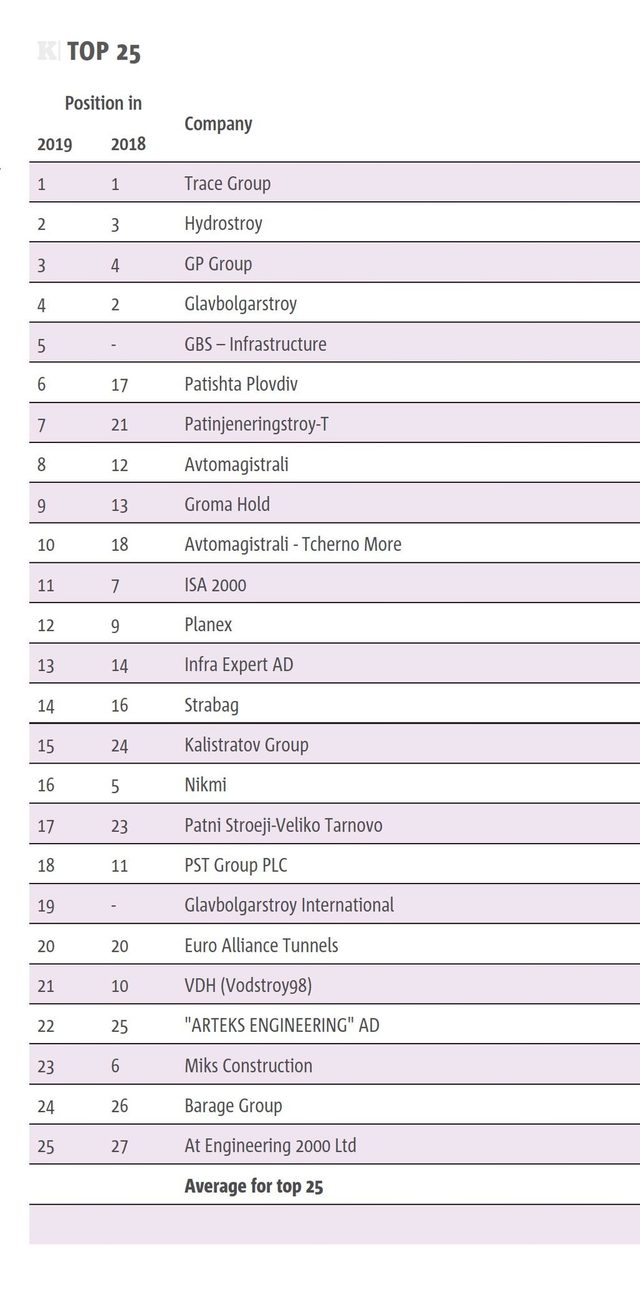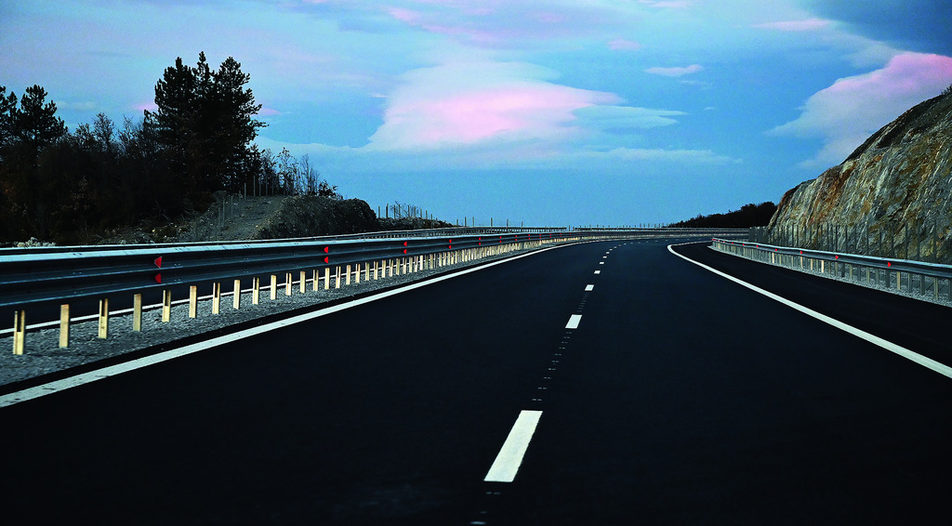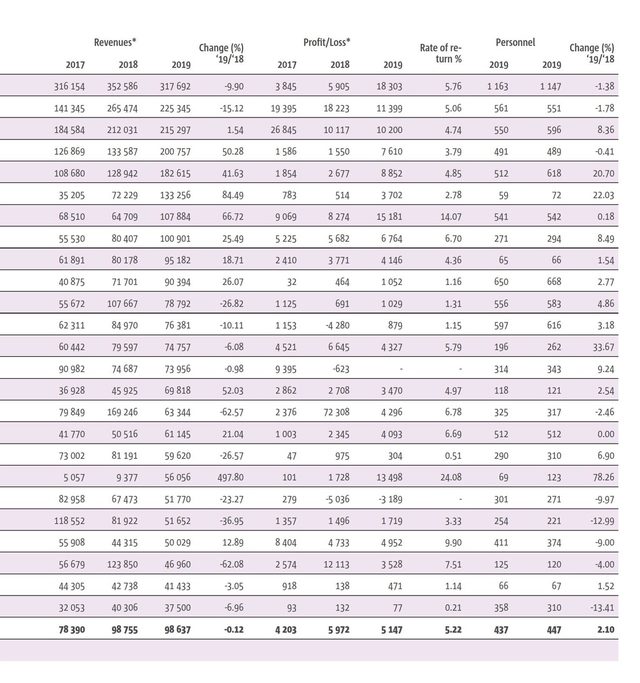- The leadership in the construction industry remains unchanged: Trace Group Hold, GBS, GP Group, Hydrostroy
- Government contracts for the construction of road, water, gas and railway infrastructure are the main source of revenue for the companies
- The revenues of the companies are falling slightly but profits are growing
Highways, railways, natural gas connections, water supply and sewerage - the central and municipal governments remain the largest source of revenue in the construction sector, providing projects worth billions of levs in various fields. The era of the operational programs of the EU is coming to an end, except in the water sector, where tenders for hundreds of millions of levs were announced in recent months.
If companies working on private projects for construction of industrial facilities and buildings appeared in the ranking last year, now they are again inferior to infrastructure construction companies. Probably due to the lack of large foreign investors in the industry.
This year, the submission of financial statements to the Commercial Register has to be completed by the fall due to the state of epidemic emergency, so the ranking is not exhaustive. For example, Varna based Inzhstroyengineering and Sofia-based Markan are not included in the ranking, while last year they were on 8th and 15th place, respectively. In addition, the results of the companies of Glavbolgarstroy (GBS) group are not consolidated and are scattered in the ranking. However, the dominance of infrastructure builders is obvious.
A look at the industry
According to an analysis made by the Bulgarian Construction Chamber, the construction output for 2019 amounts to BGN 17.1 billion, which is an increase of over 8% compared to the previous year. Construction of buildings increased by 13%, while the construction of engineering projects increased by only 2.2%. More than 3000 buildings were completed and commissioned in 2019, compared with 2300 in 2018.
If we look at the combined turnover of the 25 largest construction companies in 2019, it is flattish, as the average decrease is just 0.1%. Especially when it comes to BGN 1.5 billion in total revenues achieved by the top 25 companies.
"Overall, 2019 was a good year for the sector, in 2017-2018 there was a significant pick-up in investment activity on both the housing and office market, as well as in the industrial sector. To a large extent, these positive financial results are a consequence of the momentum gained in previous periods, since a large number of projects that started then were completed and paid off during the last calendar year," Glavbolgarstroy commented.
In 2019, public procurement contracts worth over BGN 8.6 billion were concluded, which is an increase of nearly 200% compared to 2018, according to the data provided by the Construction Chamber.
Public investment is a major pillar of revenue for the largest builders, while their privately-financed projects are negligibly small, Trace Group Hold, Groma Hold, Road Construction - Veliko Tarnovo told Capital Weekly. The same is evident from the projects of European Roads and Hydrostroy. For GBS, the ratio was 60/40 in favour of state-financed projects in 2019, the company commented in response to questions by Capital.
However, among the top 20 construction companies, only two do not work on large-scale state-financed projects - Varna-based Planex, and Sofia-based NIKMI. The first is part of Planex Holding. In 2019, Plamen Andreev left the holding company and Hristo Dimitrov remained the sole owner. Andreev remains a partner with Daniela Stefanova in Planex Invest. Planex's projects are mainly residential buildings and hotels. In 2019, the company reported a slight decline in turnover but recovered from its losses and swung to profit. Last year, Wave Resort in the village of Aheloy was completed and their development project Delta Planet Mall in Varna covering 110,000 square meters was opened.
In the last year's edition of the ranking, sixth position was held by Mix Construction which also deals mainly in private projects in the field of industrial construction. It built the logistics center of furniture retailer JYSK in Bozhurishte, which opened in September 2019. In this year's edition, the company has dropped to 23rd position.
Roads - the Key to Growth
The revenues of the leader, Trace Group Hold, are formed by a number of construction sites in Bulgaria and Serbia, including Sofia metro, repairs in the municipality of Stara Zagora, rehabilitation of the railway sections Skutare - Orizovo and Straldzha - Tserkovski; road maintenance in Lovech Region under a four-year contract with the Road Infrastructure Agency (RIA). Several sites in Serbia are also important for the revenue stream, including sections of E75 highway and E80 highway. In contrast to the holding company's revenues, its profit tripled in 2019 compared to the previous year, on the back of the Serbian projects, representatives of Trace commented. In 2020, they completed three stations of Sofia's third metro line - Orlov Most, Teatralna and Hadzhi Dimitar.
They recently signed a BGN 90 million contract for the reconstruction of Plovdiv railway junction with the National Railway Infrastructure Company (NRIC). In the road infrastructure sector in Serbia, they are working on three lots of E-80 highway and rehabilitation of the Vlasotice - Svodje road. They are implementing projects in Sofia, such as the expansion of Todor Kableshkov Blvd. in the section from Bulgaria Blvd. to Louis Ayer St., and they also started a five-year contract for road maintenance in Stara Zagora Region.
The largest company in the construction group is Glavbolgarstroy - with total revenue of BGN 400 million of its three units in the ranking, all of which have double-digit revenue growth and three-digit profit growth. Last year, the group ranked second with its consolidated financial statement.
"The largest company in Glavbolgarstroy group - Glavbolgarstroy AD, specializes in the construction of buildings and industrial facilities. It also covers part of the group's product range, such as main beams for bridge structures," GBS said in response to a query by Capital. "In 2019, we completed several of our own investment projects, which we implemented on land acquired years ago (G Tower, G Home, Borovets Gardens), and they are the reason for the significant profit growth of Glavbolgarstroy AD," the company explained.
Glavbolgarstroy International deals in natural gas infrastructure projects.
GBS was awarded a significant share of the largest construction contracts in Bulgaria in recent years. Some of the latest orders include the second stage of the modernization of compressor stations Petrich, Lozenets and Ihtiman of gas transmission company Bulgartransgaz worth over BGN 90 million, a lot of Struma highway for BGN 36 million, a section of Europe highway for BGN 117 million, the southern arch of Sofia Ring Road for BGN 143 million, a wastewater treatment plant in Plovdiv for BGN 70 million, a wastewater treatment plant and repairs of the water supply network in Tutrakan for BGN 25 million, as well as the construction of a children's hospital in Sofia for BGN 100 million.
Some of the private projects listed by Glavbolgarstroy include the pharmaceutical and animal food additive production plant of Biovet in Peshtera, as well as Biovet's production plant for immunogenic pharmaceutical products in Razgrad, a distillery for essential oil crops near the village of Starosel in Hissarya municipality, as well as an expansion of the existing slag landfill of copper producer Aurubis Bulgaria.
This year, GP Group is in third place. Following a series of public scandals surrounding EU-funded projects in Bulgaria, the company now shows a minimal growth in revenue and profit in 2019. Over the course of the year, the company participated in the construction of the subway network in Sofia and is now involved in the construction of Garitage Park residential and office complex in Sofia, as well as the Zheleznitsa tunnel on the Struma highway, slated to be Bulgaria's longest road tunnel.
European Roads company shows remarkable growth with a revenue increase of 84% and profits up sixfold over 2018. The base-year result was not low but the company did not respond to Capital's queries which sites had led to this jump in profit. Two of the projects the company has been a part of in the last year were the consortium building the section of Struma highway between Blagoevgrad and Krupnik, as well as 15km of renovation works on the road connecting Chirpan to Simeonovgrad worth BGN 12 million. The company's biggest shareholder is Anka Saveva, mother of Hristo Savev who owns big construction company Groma Hold known until 2018 as Agromah.
Groma Hold's revenue growth of 19% is a lot more modest. The company is part of the consortium which won the tender for the construction of Struma highway via the Kresna Gorge but it is still unable to sign a contract with the Road Infrastructure Agency since funding for the project has not yet been secured.
The state is also becoming increasingly active in the sector through its company Avtomagistrali owned by the Ministry of Regional Development and Public Works. The company has gone up from 12th to 8th place, its net revenues amounting to over BGN 100 million, including BGN 85.5 million from sales. The figures mark revenue growth of 25% and 19% rise in profit
In 2019, Avtomagistrali completed repairs on sections of Trakia and Hemus highways, the company said in a statement. In December 2018 and December 2019, the government assigned the construction of the remaining part of Hemus route to the state-run company without announcing a tender for over BGN 2 billion worth of works. In October 2019, following the same in-house principle, the Road Infrastructure Agency concluded a contract with Avtomagistrali for mitigating landslides worth half a billion levs. According to the company's financial reports, two-thirds of its sales revenue stems from construction and installation works, with the remaining one-third coming from highway maintenance.
Veliko Zhelev's Hydrostroy is in second place this year. In 2018, the company marked an increase in its turnover of 85% versus 2017, while in 2019 it shows a slight decline. Over the course of last year, the company concluded the construction of 9 km of Hemus highway between Yablanitsa and Boaza junctions ahead of schedule, as part of a consortium. Executive director Nikolay Pashov announced that they had also completed the reconstruction of part of the water supply network in Dobrich, the wastewater treatment plant in Vidin, as well as the reconstruction of RIU Astoria Hotel in Zlatni Pyasatsi coastal resort. This fall, the company is expected to complete the construction of Zlatni Pyasatsi water treatment plant. The ill-fated Vasil Levski Boulevard in Varna was also their project, officially opened last year but subsequently suffering from a lot of problems, most recent flooding.
No emergency
The coronavirus pandemic did not have too harsh an effect on the pace of work in the construction sector, which represented one of the few industries that could progress as planned. "We work with external contractors so we've had difficulties in supplying materials and goods from abroad", says Victor Velev, manager at Groma Hold.
Investment intentions may slow down due to the pandemic but the impact is expected mainly in the private sector. Filip Marinov, manager of Patni Stroezhi Veliko Tarnovo, which recently completed the bypass road of Gabrovo city, told Capital that the municipalities whose tenders the company is working on have not changed their intentions. With regard to the period of emergency and the pandemic, Nikolay Pashov from Hydrostroy commented: "We faced no critical situations due to delayed payments. As far as investment intentions go, we have not cancelled them, and we see them as more or less inevitable, considering the constant push to maintain growth and increase production capacity."
In March of 2020, after the state of emergency had been introduced, construction output in Bulgaria marked a double-digit decline both on an annual and a monthly comparison basis. According to data provided by the Public Procurement Agency, 491 contracts were concluded in the first quarter of 2020 worth a total of BGN 596 million. In comparative terms, their number has increased by 12.1% over the same period for 2019, but the contractual value has decreased by 3.6%. Engineering infrastructure construction marks a decrease of 20.8% in the amount of concluded contracts and a value drop by 55.4%. Compared to March 2019, the construction output in Bulgaria has decreased by 14%, and there was also a decline of 11.2% versus February, as reported by Trace Group Hold.
"We are expecting a change in the direction of investments, so logically we would be seeing a slowdown in hotel construction, and we are also noticing some trends emerging in the labour market. In any case, our business plans are built around a higher percentage of risk than previously," according to Planex, who are primarily reliant on private investment and not public tenders.
The state sector
It looks as though government procurement will retain its role as the most significant factor contributing to growth in the construction sector. "These are projects of national importance and I believe they represent a fundament to growth in the industry. We should not underestimate private investments either, since those are increasing, with more and more projects in different parts of the country is completed thanks to them," commented Groma Hold's Victor Velev.
Public procurement for water supply under the operational program Environment will continue being an important factor in the construction industry until 2024 when the water projects in the country should be completed. Tenders for at least half a million levs were announced in the short period between March and June 2020 in Burgas, Sliven, Plovdiv, Varna, Stara Zagora, Shumen, Silistra. The financial impact of water infrastructure renovation will, however, become felt after a year or two, once companies start work on these orders.
In addition, the industry expects that the money from the construction of the Hemus highway will indirectly flow into the sector - something the companies welcome in unofficial comments. The law stipulates that Avtomagistrali cannot use subcontractors, but it does have a number of rental contracts for equipment or for the sale of construction materials. "So far, we have had construction machinery leased at the site by Hydrostroy, Avtomagistrali Hemus and Patengineerstroy T", the state-owned company said in May.
The Road Infrastructure Agency is already awarding the construction of sections of the Botevgrad - Mezdra road as some of its larger projects. The selection of contractors for the construction of Burgas bypass road for over BGN 50 million, as well as the tunnel under the Shipka Pass for over BGN 300 million, are forthcoming. Hypothetically, the construction of Struma via the Kresna Gorge should also start but no contracts have been concluded with contractors yet, and funding has not been secured. June 2020 saw the opening of bids in tenders for the Sofia subway worth an estimated BGN 220 million excluding VAT. Projects of National Railway Infrastructure Company are also moving forth. For example, a contractor is soon to be selected for the Voluyak - Dragoman railway section in a tender worth an estimated BGN 345 million excluding VAT.
In early May 2020, there was even talk of renewing the so-called rehabilitation program with GERB, with BGN 2 billion poured into that - funds which were aimed at the smaller companies in the industry. - това не го разбирам

- The leadership in the construction industry remains unchanged: Trace Group Hold, GBS, GP Group, Hydrostroy
- Government contracts for the construction of road, water, gas and railway infrastructure are the main source of revenue for the companies
- The revenues of the companies are falling slightly but profits are growing
Highways, railways, natural gas connections, water supply and sewerage - the central and municipal governments remain the largest source of revenue in the construction sector, providing projects worth billions of levs in various fields. The era of the operational programs of the EU is coming to an end, except in the water sector, where tenders for hundreds of millions of levs were announced in recent months.













